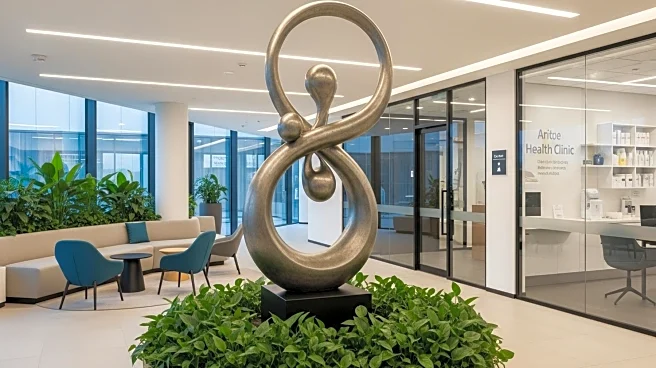What's Happening?
Sanofi has relocated its U.S. headquarters to Morristown, New Jersey, investing $130 million in a new 260,000-square-foot office space. This move is part of a broader strategy to modernize workspaces globally. The new headquarters is strategically located near an NJ Transit station, offering employees easy access to public transportation. The facility includes a variety of amenities such as an on-site health clinic, a restaurant, flexible workspaces, and a rooftop terrace. The health clinic is particularly notable, with approximately 15% of employees using it as their primary care provider. The office is designed to encourage employees to return to in-person work by creating a comfortable and collaborative environment.
Why It's Important?
The relocation and investment in the new headquarters reflect Sanofi's commitment to enhancing employee satisfaction and productivity. By providing a range of amenities and a convenient location, Sanofi aims to attract and retain top talent, reduce absenteeism, and improve overall employee well-being. The inclusion of an on-site health clinic underscores the company's focus on employee health, which can lead to reduced healthcare costs and increased productivity. This move also aligns with broader trends in corporate real estate, where companies are investing in high-quality, sustainable office spaces to foster collaboration and innovation.
What's Next?
Sanofi's new headquarters is expected to set a precedent for other companies considering similar investments in employee-centric office spaces. The focus on sustainability and accessibility may influence future corporate real estate developments. As employees adapt to the new environment, Sanofi will likely monitor the impact on employee engagement and productivity. The success of this initiative could lead to further enhancements in other Sanofi locations globally.
Beyond the Headlines
The design of Sanofi's new headquarters, which resembles a boutique hotel more than a traditional office, highlights a shift in corporate culture towards creating more inviting and flexible work environments. This approach may challenge conventional office norms and encourage other companies to rethink their workspace strategies. The emphasis on well-being and collaboration over traditional workstations could lead to long-term changes in how companies structure their physical workspaces.









